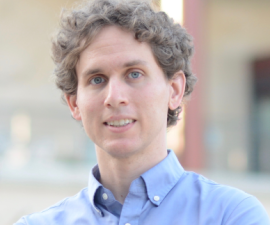

Research Bio
Jacob Steinhardt's goal is to make the conceptual advances necessary for machine learning systems to be reliable and aligned with human values. This includes the following directions:
- Robustness: How can we build models robust to distributional shift, to adversaries, to model mis-specification, and to approximations imposed by computational constraints? What is the right way to evaluate such models?
- Reward specification and reward hacking: Human values are too complex to be specified by hand. How can we infer complex value functions from data? How should an agent make decisions when its value function is approximate due to noise in the data or inadequacies in the model? How can we prevent reward hacking--degenerate policies that exploit differences between the inferred and true reward?
- Scalable alignment: Modern ML systems are often too large, and deployed too broadly, for any single person to reason about in detail, posing challenges to both design and monitoring. How can we design ML systems that conform to interpretable abstractions? How do we enable meaningful human oversight at training and deployment time despite the large scale? How will these large-scale systems affect societal equilibria?
These challenges require rethinking both the theoretical and empirical paradigms of ML. Theories of statistical generalization do not account for the extreme types of generalization considered above, and decision theory does not account for cases where the reward function is only approximate. Meanwhile, measuring empirical test accuracy on a fixed distribution is insufficient to analyze phenomena such as robustness to distributional shift.
Research Expertise and Interest
artificial intelligence, machine learning
In the News
COVID-19: Tracking, data privacy and getting the numbers right
As plans for re-opening businesses, communities and schools emerge, it becomes increasingly important to better understand how many people are being infected and dying from COVID-19, and where and how the new coronavirus is transmitted.
Featured in the Media
Please note: The views and opinions expressed in these articles are those of the authors and do not necessarily reflect the official policy or positions of UC Berkeley.
April 21, 2020
A new analysis of Google's Community Mobility Reports by assistant statistics professor Jacob Steinhardt and a colleague at MIT estimates that San Francisco might be able to regain up to 70% of normal mobility without spurring a major resurgence of the COVID-19 outbreak once it has passed it initial peak of cases. The study looked at other regions, as well, tailoring their predictions based on data regarding caseloads. Professor Steinhardt stresses the caveat that their conclusions are highly uncertain, and the regions they analyzed should not ease restrictions without first instituting effective strategies to track the disease's spread to quickly identify rebounds. "With the data we currently have, we actually just don't know what the level of safe mobility is," Professor Steinhardt says. "We need much better mechanisms for tracking prevalence in order to do any of this safely."
Loading Class list ...

